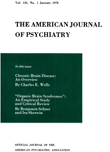The Use of Lithium in Affective Disorders, III: A Double-Blind Study of Prophylaxis in Bipolar Illness
Abstract
The authors studied 52 manic-depressive patients who were assigned to either lithium or placebo during their normal interval phases for periods up to 28 months. Patients receiving lithium had fewer manic and depressive episodes per patient-year than placebo patients. However, this difference may have been due to a sample bias produced by a large dropout rate among patients who had manic episodes. The findings also suggest a relationship between response to lithium and family history of bipolar illness.
Access content
To read the fulltext, please use one of the options below to sign in or purchase access.- Personal login
- Institutional Login
- Sign in via OpenAthens
- Register for access
-
Please login/register if you wish to pair your device and check access availability.
Not a subscriber?
PsychiatryOnline subscription options offer access to the DSM-5 library, books, journals, CME, and patient resources. This all-in-one virtual library provides psychiatrists and mental health professionals with key resources for diagnosis, treatment, research, and professional development.
Need more help? PsychiatryOnline Customer Service may be reached by emailing [email protected] or by calling 800-368-5777 (in the U.S.) or 703-907-7322 (outside the U.S.).



